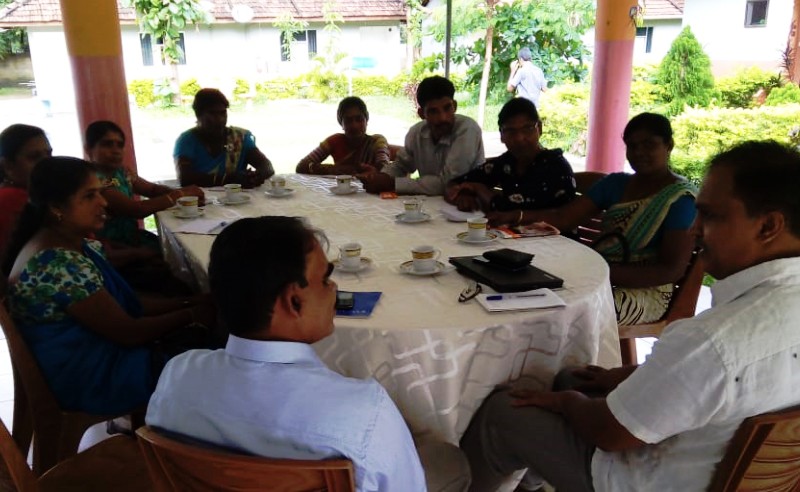Raised: Rs. 0


Empowering the society in Kilinochchi by reducing suicidal incidents, attempted suicides and other psychosocial traumatic incidents.
The Northern part of Sri Lanka is still experiencing the consequences of three-decade-long armed conflict. More specifically, the population in Kilinochchi and Mullaitivu districts, which has witnessed the final days of the war, has highly been stigmatized. Besides countless death and destructions, from psychological point of view, the public of northern province experience abject hardship in enduring the nature of stigmatization; difficulties experienced by amputees and wounded persons; indescribable economic loses; absence of solutions for forcibly disappeared persons; proliferation of lending agencies and the consequences of unbearable debt the public owed as a result of micro and macro loans; unexpected surge of the usage of narcotic substances; the practice of polygamy; teenage pregnancy; sexual exploitation and related crimes; high rate of unemployment; abnormal behavioural changes in individuals, etc. The results of multi-stakeholder analyses have confirmed the abrupt situation that highlights the age spectrum of those who suicide ranges from children to adults. It has been observed that the monthly average of attempted suicidal incidents is around 35 and the suicidal cases are around 4 to 5 individuals. At present, apart from life-saving treatment for emergency cases, there are no measures available for saving the attempted suicide cases in northern Sri Lanka. Furthermore, the availability of related skilled human resources to offer those who attempt suicide with appropriate counselling and raising community awareness on suicides still lack. It is, therefore, useful to note that unless the issue is tackled very effectively, the society of northern Sri Lanka, particularly in Kilinochchi and Mullaitivu districts would become ineffective and under-developed.
• Identify individuals who possess suicidal thoughts. • Provide counseling services for those who are in need • Conduct monthly awareness activities at all four divisions for villagers to identify a person need counseling. • Train village leaders with basic skills in dealing with those who attempted suicide and who possess suicidal thoughts • Provide training for counselors to deliver a better psycho-social counseling service for the beneficiaries. • Undertake continuous surveillance to ensure proper services reach beneficiaries and strengthen the support of family members. • Develop network and refer beneficiaries to the service providers for assistance including livelihood support
One year - 2019-03-15 to 2020-03-14
A. Preventive strategies by community outreach: The proposed intervention will be implemented with the collaboration of district and divisional psychosocial units attached to the district and divisional secretariats. Part of this intervention is to build the capacity of the concerned psychosocial units. In Kilinochchi district, for Karachchi, Kandavalai and Pachchilaippalli and Poonahari divisions, one Psychosocial Assistant per division will be appointed. The mandate of the divisional Psychosocial Assistants is identifying individuals who are psychologically vulnerable and highly prone to suicide as well as mapping the places where a high rate of potential suicidal cases is observed and offering them with the appropriate psychosocial and livelihood interventions. The officer who coordinates the divisional level psychosocial activities will be based in UNHD Kilinochchi Office. To improve the efficiency of the intervention, social activists will be added on to the divisional counselling centres. The mandate of social activists will be planning and designing appropriate interventions on social networking, livelihood development, and income generation, etc. Moreover, those in need of contacting social service will be referred to the appropriate social service agency. B. Clinical measure: This involves the intervention of divisional hospitals. Under this measure, each divisional hospital will have a psychosocial counselling centre, where a psychological counsellor will be appointed. The counsellor in each hospital will render the counselling service to those who have attempted suicide, who have been abused, who are under the addiction of drugs and narcotics, and other psychosocially needy persons. The affected individuals will be kept monitoring even after they have left hospitals. C. Monitoring and Evaluation: The above psychosocial interventions will be technically supervised by a District Counsellor (Psychosocial – government officer), Clinical Psychologist (hired by UNHD) as well as the Medical Officer of Mental Health (MOMH) attached to the Regional Director of Health Services (RDHS). The progress of the intervention will be reviewed and evaluated in the monthly review meetings. On top of that, the progress of the intervention will be reviewed in the district level psychosocial wellbeing forum that is headed by the MOMH of regional health service.
a. Objective indicators: (i) Average suicidal attempts in a defined period; (ii) The number of beneficiaries for livelihood development interventions b. Project output indicators: (i) Identified individuals who have attempted suicide or who possess suicidal thoughts; (ii) The number of psychosocial wellbeing centres; (iii) The number of psychosocial counsellors and social activists; (iv) The number of individuals who attend monthly community awareness programs; (v) The percentage of the beneficiaries who have been referred to the NGOs for livelihood assistance; (vi) The number of interventions implemented that are suitable for beneficiaries